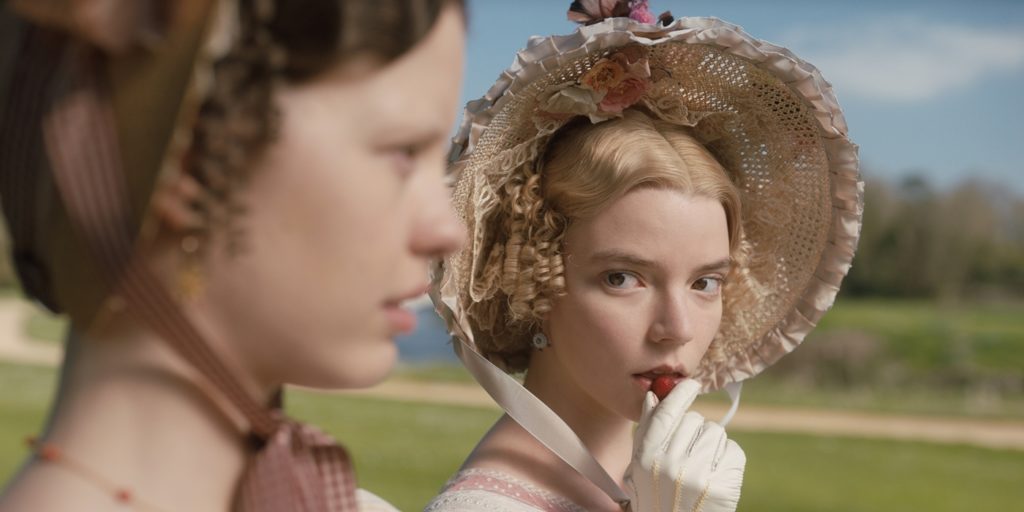After the disappointing Persuasion, a guide to making the works of Jane Austen deliver on-screen.
With every new adaptation of a Jane Austen novel announced, I feel a drop in the pit of my stomach. It’s a feeling that says here comes the discourse. In the world of Jane Austen fandom, bitter rivalries between divergent schools of thought pop up like dandelions in the summertime. The traditionalists believe anything not made within the mold of Andrew Davies’s 1995 Pride & Prejudice miniseries is apocryphal–including (for some but not all) the race of its cast. On the other side are the folks who want nothing more than to see these vibrant, relatable characters in newer and fresher ways, people who understandably want to see themselves reflected back at them.
While most Jane Austen stans fall somewhere in the middle (myself included), the contention between the new and old, modern and traditional, has never been more heated. In some fan groups, discussions of race and colorblind casting are quietly deleted by moderators, leaving non-white Jane Austen lovers out of the conversation. In one group, someone posted a meme that superimposed the new Persuasion cast over a poster for one of the Carry On films–films notorious for their sexist and racist content, including white actors in Black and Brownface.

All of this makes discussing Carrie Cracknell’s Persuasion a literal minefield. On the one hand, you have a wonderfully diverse cast of seasoned and new actors on the scene. In such a predominately white space as the Jane Austen fandom, it’s vital that non-white audiences have the representation they deserve. Yet, on the other hand, the film itself is an utterly joyless slog, impossible to laud for anything but the diverse cast. Giving such an exciting group of actors next to nothing to work with is crime enough, but knowing that these negative reviews will doubtlessly be used as ammunition–the film’s diversity weaponized against its target audience–does both the actors and the viewers a disservice.
So how did it all go so wrong? You’ll see review after review after review comparing Cracknell’s Persuasion to Phoebe Waller-Bridge’s Fleabag, where the 4th wall-breaking interactions with the audience show just how alienated this character is by guilt, trauma, and depression. Anne Elliot’s sly little glances and (often mean-spirited) asides don’t read so much as “I’m the black sheep of the family I’m gently making fun of” as they do “I’m probably the worst out of all of them.” Anne’s new, dramatic quirks are more offputting than endearing, and the chemistry between Dakota Johnson and Cosmo Jarvis–a fine actor who for some reason spends a good portion of this movie just shouting his lines–is so limp and cold I wondered who in the production had actually read Persuasion.
Creators would do well to remember that there is a reason why Austen’s works are still so popular centuries later: because they’re already so relatable.
The squandering of so much potential is especially irritating when you consider the two most recent Austen adaptations to precede Persuasion– Joel Kim Booster’s divine take on Pride & Prejudice Fire Island and Autumn De Wilde’s sumptuous update of Emma. Both films lean into modern sensibilities–Emma. as a period piece, Fire Island as a present-day queer rom-com.
For a film about five gay men on holiday, Fire Island might be the truest to Austen’s original vision of any movie since Amy Heckerling’s Clueless. Fire Island got plot characterizations right that even Joe Wright’s 2005 Pride & Prejudice missed and brilliantly managed to weave traditional Austen elements into a fresh and modern narrative. De Wilde’s Emma does the same in reverse, incorporating more modern sensibilities into the regency setting.

What these two films have in common is their innate understanding of the source material. Adaptations don’t have to be white, cishet, or period to be true to Austen’s works. I should also note that Emma, as fun and effervescent as it was–is also very, very white and would have benefitted from similar casting as Persuasion. All that aside, Booster and De Wilde’s obvious love of Austen’s brilliance–and gentle acknowledgment of her flaws–comes through so well in both Fire Island and Emma.
Creators would do well to remember that there is a reason why Austen’s works are still so popular centuries later: because they’re already so relatable. There’s no need to painfully shoehorn in concepts like “playlists” and “self-care” to make Austen’s characters easier to connect with. Austen wrote about the inner lives of women. She wrote about family, friendship, and mostly (and most importantly) self-discovery. “Until that moment, I never knew myself,” Lizzy Bennet confesses in Pride & Prejudice because she has grown and learned and figured out how to admit when she is wrong.
Unfortunately, Cracknell’s Anne Elliot never gets there. She does not explore the self, has no reconciliation with her own mistakes and misunderstandings. Rather than being the heroine who is always looking inward, all she can do is project out. That’s what separates Persuasion from its peers. Until creators figure that out, here are a few more thoughtful and modern Austen adaptations to watch instead of Persuasion:

Metropolitan – Dir. Whit Stillman (Mansfield Park)
A clever update on one of Austen’s most challenging books, Whit Stillman’s first foray into Austen adaptation follows a group of wealthy young socialites the summer before college. Stillman manages to make the Fanny Price character less opaque and more relatable than Austen’s original text, and it’s such a time capsule that the Gunne Sax dresses alone are worth seeing.
Bride & Prejudice – Dir. Gurinder Chadha (Pride & Prejudice)
One of the most charming updates to Pride & Prejudice, Gurinder Chadha’s film moves the story from Georgian England to present-day Amritsar, India in this vibrant, Bollywood-style romcom. Aishwarya Rai and Martin Henderson clash wonderfully as our modern-day Darcy and Lizzy/Lalita.
From Prada to Nada – Dir. Angel Gracia (Sense & Sensibility)
The beauty of From Prada to Nada lies in its goofy, low-budget charm and its embrace of Latinx culture. Eleanor and Marianne Dashwood are translated to Nora and Mary Dominguez, who are forced to leave their life of luxury and return to the working-class neighborhood their father came from. Wilmer Valderrama standing in as the Colonel Brandon character is an especially good turn.
Ruby in Paradise – Dir. Victor Nunez (Northanger Abbey)
Like Mansfield Park, Northanger Abbey is one of the lesser-known and lesser-adapted of Austen’s works. In part because it’s also one of the silliest. Written partly as a satirical send-up of the gothic romances of the time, Northanger would be a demanding text to adapt. Still, director Victor Nunez manages to take what is essentially Regency Mad Magazine and turn it into a quietly introspective masterpiece that follows a year in the life of a small-town girl on her own for the first time. A young Ashley Judd plays the girl in question in only her third film and fourth on-screen appearance. The film took home the grand prize at the 1993 Sundance Film Festival.